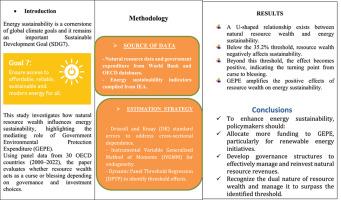The resource hypothesis revisited: Analysing the OECD experience in energy sustainability
IF 9.2
2区 经济学
Q1 ECONOMICS
引用次数: 0
Abstract
This study examines the impact of natural resource wealth on energy sustainability, with a particular focus on the moderating role of government environmental protection expenditure (GEPE). Using data from 30 OECD countries spanning 2000–2022, the analysis employs advanced econometric methods including Driscoll-Kraay (DK) standard errors, the Instrumental Variable Generalised Method of Moments (IV-GMM), and the Dynamic Panel Threshold Regression (DPTR) model. The findings reveal a nuanced relationship between natural resource wealth and energy sustainability. Initially, resource wealth exhibits a negative correlation with energy sustainability. However, beyond a critical threshold of 35.2 %, this relationship reverses and becomes positive. This turning point underscores the dual nature of natural resource wealth, which can act as either a curse or a blessing, depending on how effectively it is managed and the scale of revenues it generates. The results demonstrate a U-shape relationship between natural resource wealth and energy sustainability. Furthermore, the study finds that when natural resource wealth interacts with GEPE, it positively impacts energy sustainability. Based on these findings, policymakers should focus on increasing allocations to GEPE to fund renewable energy projects and enhance energy sustainability while establishing robust governance frameworks to manage resources wealth efficiently.

重新审视资源假设:分析经合发组织在能源可持续性方面的经验
本研究考察了自然资源财富对能源可持续性的影响,特别关注政府环境保护支出(GEPE)的调节作用。利用2000年至2022年期间30个经合组织国家的数据,该分析采用了先进的计量经济学方法,包括Driscoll-Kraay (DK)标准误差、工具变量广义矩法(IV-GMM)和动态面板阈值回归(DPTR)模型。研究结果揭示了自然资源财富与能源可持续性之间的微妙关系。最初,资源财富与能源可持续性呈负相关。然而,超过临界阈值35.2%,这种关系就会逆转并变为正相关。这一转折点凸显了自然资源财富的双重性质,它可以是祸也可以是福,这取决于它的管理效率和产生的收入规模。结果表明,自然资源财富与能源可持续性之间呈u型关系。此外,研究发现,当自然资源财富与GEPE相互作用时,它会对能源可持续性产生积极影响。根据这些发现,政策制定者应侧重于增加对GEPE的拨款,以资助可再生能源项目,提高能源可持续性,同时建立强有力的治理框架,以有效管理资源财富。
本文章由计算机程序翻译,如有差异,请以英文原文为准。
求助全文
约1分钟内获得全文
求助全文
来源期刊

Energy Policy
管理科学-环境科学
CiteScore
17.30
自引率
5.60%
发文量
540
审稿时长
7.9 months
期刊介绍:
Energy policy is the manner in which a given entity (often governmental) has decided to address issues of energy development including energy conversion, distribution and use as well as reduction of greenhouse gas emissions in order to contribute to climate change mitigation. The attributes of energy policy may include legislation, international treaties, incentives to investment, guidelines for energy conservation, taxation and other public policy techniques.
Energy policy is closely related to climate change policy because totalled worldwide the energy sector emits more greenhouse gas than other sectors.
 求助内容:
求助内容: 应助结果提醒方式:
应助结果提醒方式:


